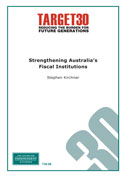
The deterioration in the federal government’s fiscal position reflects a failure to adhere to a rules-based framework for fiscal policy to guide spending and tax decisions.
Fiscal policy has been distracted by the pursuit of macroeconomic stabilisation objectives that are inconsistent with the institutional design of Australia’s overall macroeconomic policy framework.
An independent central bank pursuing an inflation target, combined with a floating exchange rate, renders the change in the budget balance as a share of GDP from one year to the next an irrelevance from a cyclical perspective.
The government’s spending and tax decisions still have important microeconomic and efficiency implications that in turn influence long-run economic growth outcomes.
A failure to balance the budget over time can be costly in terms of the burden of public debt interest and the need to increase future taxes in the absence of offsetting expenditure restraint.
The cost of public sector borrowing is not just the interest rate on outstanding government debt, but the efficiency cost of future tax increases needed to repay the debt.
Expectations for the future path for net debt can undermine confidence even if current levels of debt are low by international standards.
There is a growing international trend towards the adoption of independent fiscal institutions coupled with legislated fiscal policy rules.
Local and international experience shows that independent fiscal institutions and fiscal rules, both individually and in combination, can lead to improvements in budget outcomes.
Dr Stephen Kirchner is a Research Fellow at The Centre for Independent Studies, and Editor of POLICY magazine. He is also a Senior Fellow at The Fraser Institute.











